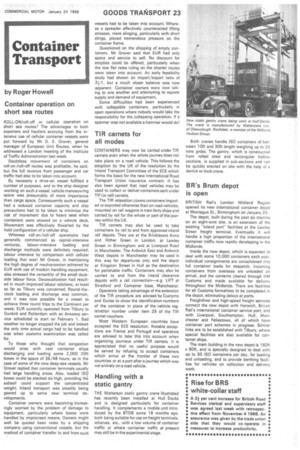TIR carnets for all modes
Page 25

If you've noticed an error in this article please click here to report it so we can fix it.
CONTAINERS may now be carried under TIR carnets even when the whole journey does not take place on a road vehicle. This follows the adoption by the UK of the resolution by the Inland Transport Committee of the ECE which forms the basis for the new International Road Transport Union insurance contract. It has also been agreed that road vehicles may be used to collect or deliver containers sent under TIF I or rail) carnets.
The TIR relaxation covers containers imported or exported otherwise than on road vehicles,
mounted on rail wagons in train ferry ships and carried by rail for the whole or part of the journey within the UK.
TIR carnets may also be used to take containers by rail to and from approved inland rail depots. They are at the Bricklayers Arms and Hither Green in London, at Lawley Street in Birmingham and at Liverpool Road in Manchester. The Ardwick East and Ardwick West depots in Manchester may be used in this way for departures only and the depot at Kingston Street in Hull as the destination for perishable traffic. Containers may also be carried to and from the inland clearance depots with a rail connection—e.g. LIFT at Stratford and Container base, Manchester. Operators taking advantage of the extension of the TIR procedure are advised by Customs and. Excise to show the identification numbers of the container in place of the vehicle registration number under item 29 of the TIR carnet vouchers.
Most Western European countries have accepted the ECE resolution. Notable excep tions are France and Portugal and operators are advised to take this into account when organizing journeys under TIR carnets. It is appreciated that no useful purpose would be served by refusing to accept containers which arrive at tile frontier of these two countries or at a port after a journey which was not entirely on a road vehicle.








































































































